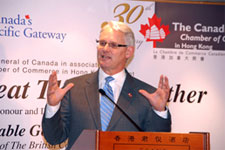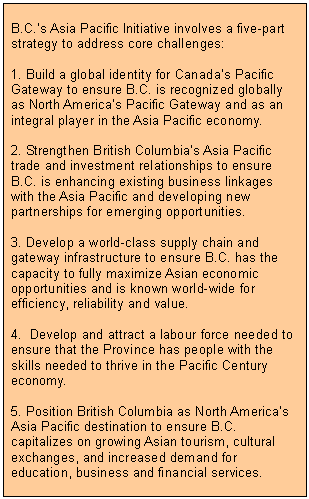Building a Green Bridge to Asia
 This is the Premier’s first visit to Asia since the launch of the province’s Asia-Pacific Initiative in April 2007, an initiative conceived in recognition of the economic importance of the Asia-Pacific region, and the need to transform BC position as an economic and cultural gateway linking Asia and North America.
This is the Premier’s first visit to Asia since the launch of the province’s Asia-Pacific Initiative in April 2007, an initiative conceived in recognition of the economic importance of the Asia-Pacific region, and the need to transform BC position as an economic and cultural gateway linking Asia and North America.“This mission is a chance to spread the word to potential investors about B.C.’s competitive advantage as Canada’s Pacific Gateway and the opportunities here for partnerships in life sciences, trade, investment and education,” said Premier Campbell.
The mission encompasses visits to Shanghai, Guangzhou, and Hong Kong in China, and New Delhi, Chandigarh, Mumbai and Bengaluru in India.
“British Columbia’s post-secondary institutions are building stronger education connections than ever before with the Asia-Pacific,” said Campbell at the official opening of the Hong Kong office of BC’s Royal Roads University. “The expanded Royal Roads presence in Asia will strengthen our links with the world’s fastest-growing economy and contribute to our efforts to increase B.C.’s profile as Canada’s Pacific Gateway.”
The office is a first for Royal Roads, although the university’s presence in the region goes back to 1999 when it began offering its MBA program throughout Asia through educational partners. RRU now has close to 2,700 alumni in China – more alumni from an Asian-based program than any other Canadian university.
Four agreements were signed between British Columbia and the Province of Guangdong, China, which will see the sister-provinces build advanced clean-energy partnerships, pursue investment and trade opportunities, and share expertise on emergency management.
The four Memoranda of Understanding cover these areas of mutual interest:
- Two MOUs on two-way investment and trade promotion will identify areas for enhanced investment and export, including natural resources, technology, manufacturing, communications and tourism. The MOUs anticipate exchanges on investment and trade policies, investment environment, and joint trade promotion activities, and build contacts between companies and investors.
- An MOU on clean energy co-operation will see the provinces exchange information on clean energy policies and regulations, such as recent legislation that sets out B.C.’s target to reduce greenhouse gas emissions by 33 per cent by 2020. The agreement also serves as a bridge for exchanges between clean energy companies, and plans invitations to seminars and trade fairs and the organization of clean-energy business missions.
- An MOU on sharing emergency management information and expertise will see the two provinces exchange information and delegations and plan for joint training opportunities for emergency management officials.
B.C.’s role as Canada’s Pacific Gateway was strengthened by an agreement signed between Vancouver International Airport (YVR) and China Southern Airlines that will see the first direct flights between Vancouver and Guangzhou starting July 2009. In India, Kingfisher Airlines has committed to operate the first non-stop Delhi-Vancouver flights as soon as possible following meetings between Premier Campbell and Dr. Vijay Mallya, Kingfisher Airlines’ chairman and CEO, in Delhi.
The Province’s Pacific Gateway Strategy is predicated on BC’s major ports, airports, railways and roadways serving as links in a supply chain providing many of the goods consumed each day throughout North America. It involves a unique partnership of Gateway industries and governments at the Federal, Provincial and Regional level working in concert to ensure a robust, reliable, and sustainable supply network.
British Columbia’s ports are the shortest marine links to the surging economies of the Asia-Pacific. Container traffic to all west coast ports is forecast to rise a staggering 300% by 2020. The Pacific Gateway Strategy has set ambitious volume targets for 2020:
- 9 million TEUs in container traffic imports from Asia-Pacific producers (up from 2 million in 2005)
- 95 million tonnes: bulk & break-bulk exports such as forestry products, agricultural products, petroleum products and metals (up from 70 million in 2005)
- 28.4 million air passengers through YVR (up from 16.4 million in 2005)
441,000 tonnes of air cargo (up from 223,700 tonnes in 2005)
China is B.C.’s second-largest trading partner, with bilateral trade of more than $10 billion in 2006. China is also the top source of immigrants to B.C., with close to 11,000 immigrants settling in B.C. in 2006. Guangdong and British Columbia have been sister provinces since 1995.
The mission will also involve discussions on green technology and partnership opportunities with Shanghai government officials. Premier Campbell toured the site of the 2010 World Expo in Shanghai, China, with Xu Bo, director of Expo’s International Participation Department and Richard T. Lee, Parliamentary Secretary for the Asia-Pacific Initiative and MLA for Burnaby North. Expo 2010 is expected to attract 71 million visitors from around the world.
In India Premier Campbell will attend the World Economic Forum’s India Economic Summit, there to highlight B.C.’s innovation, research and education connections between educational institutions and industry in India, particularly in life sciences and biotechnology.
The Premier will formally launch a new initiative to connect with alumni of B.C. post-secondary institutions living abroad, and promoting education opportunities between B.C. and India with post-secondary representatives, and will promote life sciences opportunities for trade and investment at meetings with business leaders in Mumbai and Bengaluru, India.
Together, China and Hong Kong constitute BC’s largest trading partner, accounting for 5.2 percent of BC exports. India is the province’s tenth largest export market and efforts made pursuant to the Asia-Pacific Initiative are expected to raise it significantly. B.C.’s 2020 Goal for the Pacific Century is for British Columbia to be recognized internationally as North America’s capital for Asia Pacific commerce and culture. The estimated economic impacts of achieving this goal not only will position the province as an important partner in the Asia Pacific economic region, but will also drive economic development and prosperity in Canada and B.C. for decades. The estimated annual trade impacts for Canada will rise from 2005 levels of $102 billion to $333 billion in 2020, a gain of $231 billion. For B.C. this will involve a rise from the 2005 level of $29 billion to $106 billion in 2020, a gain of $77 billion.
B.C.’s 2020 Goal for the Pacific Century is for British Columbia to be recognized internationally as North America’s capital for Asia Pacific commerce and culture. The estimated economic impacts of achieving this goal not only will position the province as an important partner in the Asia Pacific economic region, but will also drive economic development and prosperity in Canada and B.C. for decades. The estimated annual trade impacts for Canada will rise from 2005 levels of $102 billion to $333 billion in 2020, a gain of $231 billion. For B.C. this will involve a rise from the 2005 level of $29 billion to $106 billion in 2020, a gain of $77 billion.
Although the focus of this mission is to solidify British Columbia’s place as North America’s bridge to Asia and to promote international trade and investment opportunities, the Premier also recognizes the long term environmental benefits of a building strong relationships between these burgeoning economies and Canada’s environmental leaders.
“British Columbia has expertise in the development of innovative, green technology and there are opportunities in China and India, which have rapidly growing economies and are looking for ways to expand that are environmentally sustainable,” said Campbell. “We have an incredible opportunity to make connections that will benefit British Columbia and the world, both economically and environmentally.”
According to the World Energy Outlook (WEO) published by the International Energy Agency in November, by 2030 India and China will emerge as the world’s largest energy users, and both will be heavily dependent on greenhouse gas emitting fossil fuels. Strengthening British Columbia’s sustainable development relationships with these two economies may help mitigate the harmful consequences of that dependency.
The mission will open the door to the sharing of information on sustainable development; transferring green energy technologies; increasing investment in sustainable infrastructure; and strengthening academic relations with the next generation of Asian leaders. This mission will give substance to the Asia-Pacific Initiative and will place British Columbia in a better position to help develop a greener, more sustainable Asia.
For More Information: Government of British Columbia
You can return to the main Market News page, or press the Back button on your browser.

